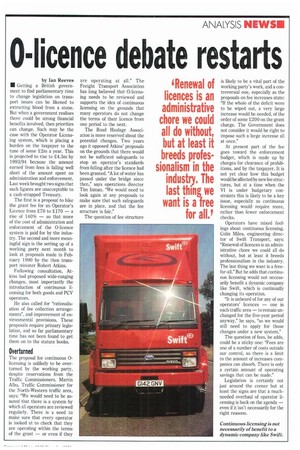0-licence debate restarts
Page 21

If you've noticed an error in this article please click here to report it so we can fix it.
by Ian Reeves Getting a British government to find parliamentary time to change legislation on transport issues can be likened to extracting blood from a stone. But when a government realises there could be strong financial benefits involved, then priorities can change. Such may be the case with the Operator Licensing system, which is placing a burden on the taxpayer to the tune of some £2m a year. This is projected to rise to £4.5m by 1993/94 because the amount earned from fees is falling well short of the amount spent on administration and enforcement. Last week brought two signs that such figures are unacceptable to a cash-strapped Treasury.
The first is a proposal to hike the grant fee for an Operator's Licence from £70 to £170 — a rise of 140% — so that more of the cost of administration and enforcement of the 0-licence system is paid for by the industry. The second and more meaningful sign is the setting up of a working party next month to look at proposals made in February 1990 by the then transport minister Robert Atkins.
Following consultation, Atkins had proposed wide-ranging changes, most importantly the introduction of continuous licensing for both goods and PCV operators.
He also called for "rationalisation of fee collection arrangements", and improvement of environmental provisions. These proposals require primary legislation, and so far parliamentary time has not been found to get them on to the statute books.
Overturned
The proposal for continuous 0licensing is unlikely to be overturned by the working party, despite reservations from the Traffic Commissioners. Martin Albu, Traffic Commissioner for the North-Western traffic area, says: "We would need to be assured that there is a system by which all operators are reviewed regularly. There is a need to make sure that every operator is looked at to check that they are operating within the terms of the grant — or even if they are operating at all." The Freight Transport Association has long believed that 0-licensing needs to be reviewed and supports the idea of continuous licensing on the grounds that many operators do not change the terms of their licence from one period to the next.
The Road Haulage Association is more reserved about the potential changes. Two years ago it opposed Atkins' proposals on the grounds that there would not be sufficient safeguards to stop an operator's standards from falling after the licence had been granted. "A lot of water has passed under the bridge since then," says operations director Tim Inman. "We would need to look again at any proposals to make sure that such safeguards are in place, and that the fee structure is fair."
The question of fee structure is likely to be a vital part of the working party's work, and a controversial one, especially as the proposals on fee increases state: "If the whole of the deficit were to be wiped out, a very large increase would be needed, of the order of some £200 on the grant charge. The Government does not consider it would be right to impose such a large increase all at once."
At present part of the fee goes toward the enforcement budget, which is made up by charges for clearance of prohibitions, and by the taxpayer. It is not yet clear how this budget would be affected by new fee structures, but at a time when the VI is under budgetary constraints this is likely to be a key issue, especially as continuous licensing would require more, rather than fewer enforcement checks.
Operators have mixed feelings about continuous licensing. Colin Miles, engineering director of Swift Transport, says: "Renewal of licences is an administrative chore we could all do without, but at least it breeds professionalism in the industry. The last thing we want is a freefor-all." But he adds that continuous licensing would not necessarily benefit a dynamic company like Swift, which is continually changing its operation.
"It is unheard of for any of our operators' licences — one in each traffic area — to remain unchanged for the five-year period anyway," he says, "so we would still need to apply for those changes under a new system."
The question of fees, he adds, could be a sticky one: "Fees are one of a number of costs outside our control, so there is a limit to the amount of increases companies can absorb. There is only a certain amount of operating savings that can be made."
Legislation is certainly not just around the corner but at least the signs are that a muchneeded overhaul of operator licensing is back on the agenda — even if it isn't necessarily for the right reasons.
















































































